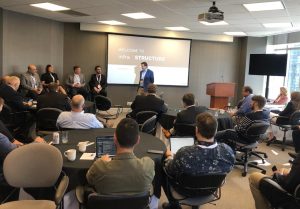
WASHINGTON, September 26, 2023 – The survival of federal broadband subsidies will be essential for the success of the Broadband Equity, Access and Deployment program, expert panelists said at the Broadband Breakfast BEAD Implementation Summit on Friday.
Broadband providers building infrastructure with funding from the $42.5 billion BEAD program will be required to participate in the Affordable Connectivity Program. The ACP, comprised of $14 billion set aside by the 2021 Infrastructure, Investment and Jobs Act, provides monthly internet subsidies of $30 for low-income households and $75 for residents of tribal lands and in high-cost areas.
Federal Communications Commission Chairwoman Jessica Rosenworcel testified to the Senate on September 19 that the money is set to dry up as early as April 2024.

That could prevent people from being able to access the networks built with BEAD funds, said Angie Kronenberg, president of tech trade group INCOMPAS.
“That’s before the network has even been built,” she said of the estimated end date. “We really, really must have this issue addressed.”
A coalition of 45 members of Congress signed in August a letter to House and Senate leadership urging them to find money for the ACP in the appropriations bill that will fund the government for the next year. Congress is likely to miss the October 1 deadline for that bill and trigger a government shutdown.
The Universal Service Fund, which spends roughly $8 billion annually to fund four internet subsidy programs, also has an uncertain future. Lawmakers are looking to change its funding mechanism – currently a tax on voice providers – and conservative groups are challenging the fund in court.

Panelists said the USF subsidies, which help low-income households, healthcare providers, schools, and libraries, in addition to rural providers in expensive-to-serve areas, will be essential for ensuring consistent, long-term access to broadband infrastructure built with BEAD and other federal funds.
“Getting people onto the network is the goal here, it’s not just planting a flag or ‘mission accomplished’ banner for building the network,” said Mike Romano, executive vice president of the Rural Broadband Association.
Scott Woods, president of public-private partnerships at broadband grant company Ready.net, agreed that expanding networks is only part of the goal for the BEAD program.
“We could spend $200 trillion on infrastructure,” he said, “but if the people it’s designed to impact can’t afford it, it’s stranded assets.”
The discussion was moderated by David Bronston, special counsel at Phillips Lytle, LLP.
If you missed the BEAD Implementation Summit, sign up for Broadband Breakfast’s BEAD Starter Pack for $35/month (cancel anytime). You’ll get access to all the videos and each of the three Breakfast Club reports prepared for the BEAD Implementation Summit:
Already a Broadband Breakfast Club member? Watch the videos!


